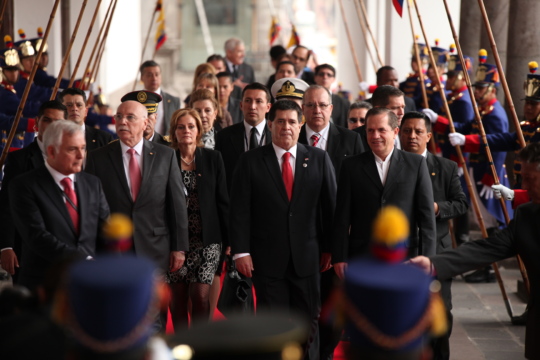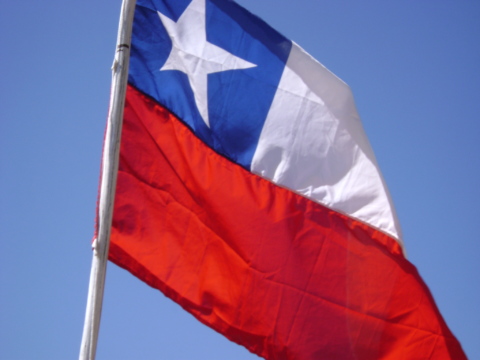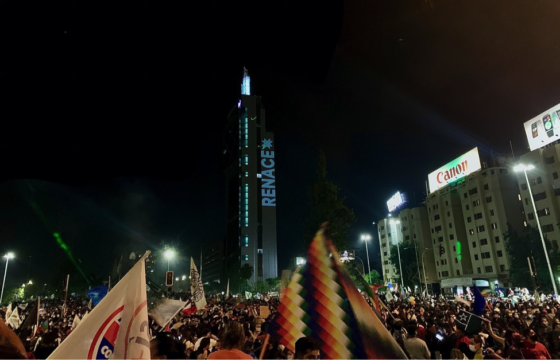
Debating Term Limits and Presidential Reelection in Latin America
Second, third, and fourth terms run rampant in Latin America. But are they such a good idea?
The massive protest in Santiago on October 25, which brought more than 1.2 million people to the streets, was a historic moment for Chile. The number of protesters was equivalent to one in sixteen Chileans, or one of every six Santiago residents. It has been called the largest protest since the dictatorship and possibly the biggest in the country’s history.
While the protest movement has so far been leaderless and adheres to no political party, its demands have been clear: a new social contract for Chile that addresses the country’s gaping socioeconomic inequality. The mechanisms for doing so are varied but have found expression in different social movements over the past few years: a new constitution, a livable wage, affordable education, quality public health care, dependable public transportation, fair utility prices, clean air, and just pensions. After decades under a brutal neoliberal authoritarian dictatorship, followed by a cautiously managed and socially tamed democracy that merely sought to alleviate the worst excesses of the inherited economic model, Chileans have cast aside the fear and fatalism that the dictatorship fought so hard to install in the national psyche and have begun to demand more. In many ways, this is the reemergence of the movement for social equality that last peaked with the election of the Marxist President Salvador Allende in 1970.
The winner from recent events would seem to be Chile’s left, namely the Communist Party and the Frente Amplio. They have been the lone political voices urging a new socio-economic model that guarantees universal social rights. Long considered an impossible ask given the strictures of Chile’s political system and the power of the country’s economic elite, the spectacular mobilizations against inequality in the past two weeks have changed the country. In the words of President Piñera: “Chile is not the same country as it was a couple weeks ago. Chile changed.” This has important implications for future political governance. In the last round of presidential elections, Frente Amplio’s candidate, Beatriz Sánchez, nearly defeated President Bachelet’s chosen successor in the first round of voting. Sánchez campaigned on a message of inequality and social rights, so will likely feel emboldened and vindicated by these protests in a future presidential campaign.
Even right-wing President Piñera has recognized the necessity of socio-economic reforms and has announced a package of measures to improve conditions for Chile’s working and middle classes. He has called for an increase in the minimum wage, a salary cut for members of congress, reducing the workweek, universal daycare, an increase in pensions, a freeze of electricity prices, higher taxes on high-income earners, and expansions in health benefits. The opposition-controlled congress, though eager to stand against Piñera, will have a hard time directly opposing these measures. While polling shows that support for the individual components of the package is high, more than 60 percent of the public believes it will not lead to greater equality. This would seem to work in the favor of Sánchez and the left, who have criticized the reform package for not going far enough in creating structural change.
Piñera’s move to the center takes away what political space remained for Chile’s center-left, which has already been outflanked on its left by the Frente Amplio. Piñera’s reform package essentially copies the kinds of changes made by the Concertación and Nueva Mayoría governments that ruled Chile for twenty-five of the twenty-nine years since the return of democracy. In the next round of presidential elections, the center-left will have little to run on and will have a hard time distinguishing itself from the outgoing Piñera administration. While Piñera currently suffers from record-low approval ratings, his gesture towards reform forces his opposition to take more extreme positions and all but guarantees that the next right-wing presidential candidate will be running against a candidate from the radical left.
Meanwhile, on the political right, a more sinister and conspiratorial narrative is emerging in response to the dominant narrative of unprecedented citizen mobilization for economic equality. Instead of focusing on peaceful protest and economic grievances, this counter-narrative tells the story of an out-of-control crime wave that gravely threatens public order and property. Piñera himself alluded to this narrative when he declared that “we are at war” and face “a powerful and implacable enemy.” A leaked audio recording of the First Lady revealed her saying that Chile was experiencing a “foreign invasion.” Press reports cited a military intelligence briefing given to Piñera that argued the attacks on the Metro stations were coordinated and premeditated. The former head of national intelligence stated that “without a doubt” there were “organizations” behind “coordinated attacks” on the metro infrastructure and that Chile was dealing with a “powerful enemy.”
The Socialist former President Ricardo Lagos told the press that he heard reports that sophisticated fire accelerants not sold in Chile were found at the scene of fires. The investigation into the culprits behind the fires has led to thus-far unsubstantiated allegations from the Chilean intelligence community regarding the participation of Venezuelans and Cubans with possible links to the intelligence services of their countries. Luis Almagro, the secretary general of the Organization of American States, attributed recent events in Ecuador, Colombia and Chile to “the winds of the Bolivarian regime pushed by Madurismo and the Cuban regime [that] bring violence, looting, destruction, and a political aim to directly attack the democratic system and try to force interruptions to constitutional mandates.” Chilean right-wing social media is alight with conspiracy theories attempting to weave these threads into a narrative that delegitimates the anti-inequality push and instead puts public security at the center of political discourse. Former acting United States Central Intelligence Agency director Michael Morell echoed this framing in a now deleted tweet that rejected the “poverty/inequality” explanation for the protests and instead attributed them to “Cuban, Venezuelan, & Russian interference.”
The far-right former presidential candidate Jose Antonio Kast has done the most to draw attention to the violence, looting, and arson that accompanied the recent protests. He has vociferously defended the Carabineros and military from criticism of the human rights violations they perpetrated during and after the protests. Former President Bachelet, in her current role as the UN High Commissioner for Human Rights, has sent a team to Chile to investigate the allegations of arbitrary arrests, torture, sexual assault, and deaths by security forces. Public opinion is divided in its characterization of the protests and the necessity of drastic measures of social control. While 50 percent of those polled think that the protests were “mainly peaceful,” 46 percent said they “mainly consisted of acts of vandalism and criminality.” As of October 23, support for the then imposed curfew was at 49 percent with 38 percent opposing, and support for the armed forces guaranteeing security was at 43 percent to 42 percent.
Polling has also shown that insecurity is a concern for a substantial portion of the population. Kast and his ideological sympathizers will inevitably try to capitalize on this. He will exploit the trope of the left turning Chile into Venezuela. If given the choice between a far-left candidate and someone like Kast, many in the center and center-right may reluctantly support him. After all, it was not so long ago that 44% of Chileans voted for eight more years of the Pinochet dictatorship in the 1988 referendum on democracy.
More than a million Chileans marching in the street will reshape political debate in Chile for some time. Piñera is smart to endorse marginal changes, in what amounts to a strategic retreat. But as long as Piñera is president, profound transformation will not occur. The big question is what comes after Piñera. For a country accustomed to political stability and centrism, the legacy of the protests is likely to be a politics in which the extremes are strengthened. And while Chile’s far left feels emboldened by current events, the far right may ultimately reap the benefits.
William Skewes-Cox, an intern with The Dialogue’s Peter D. Bell Rule of Law Program, is a J.D. candidate at Georgetown University Law Center and holds a master’s in Global Politics from the London School of Economics. He lived and worked in Chile for five years as a teacher and journalist.
Second, third, and fourth terms run rampant in Latin America. But are they such a good idea?
In Chile, the second government of Sebastian Piñera in 2018 was viewed as the end of a cycle – the return of the Latin American right, together with Macri in Argentina, Duque in Colombia, and PPK in Peru. In Chile, the main threat in the presidential elections was seen as…
A popularly written constitution marks a new founding for Chilean democracy after the Pinochet dictatorship and the subsequent decades-long transition. But it will not assure the success of any one project in particular.

